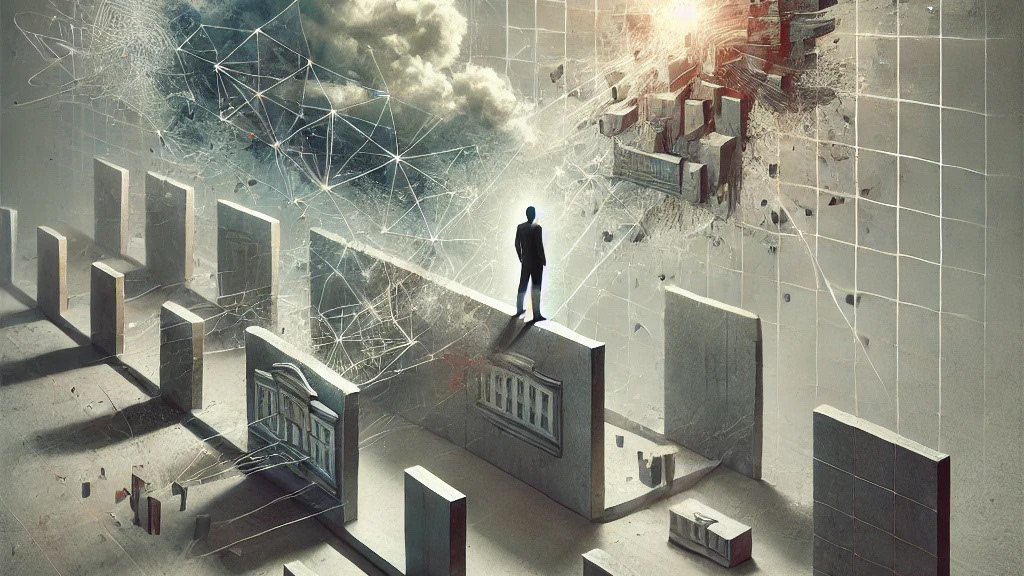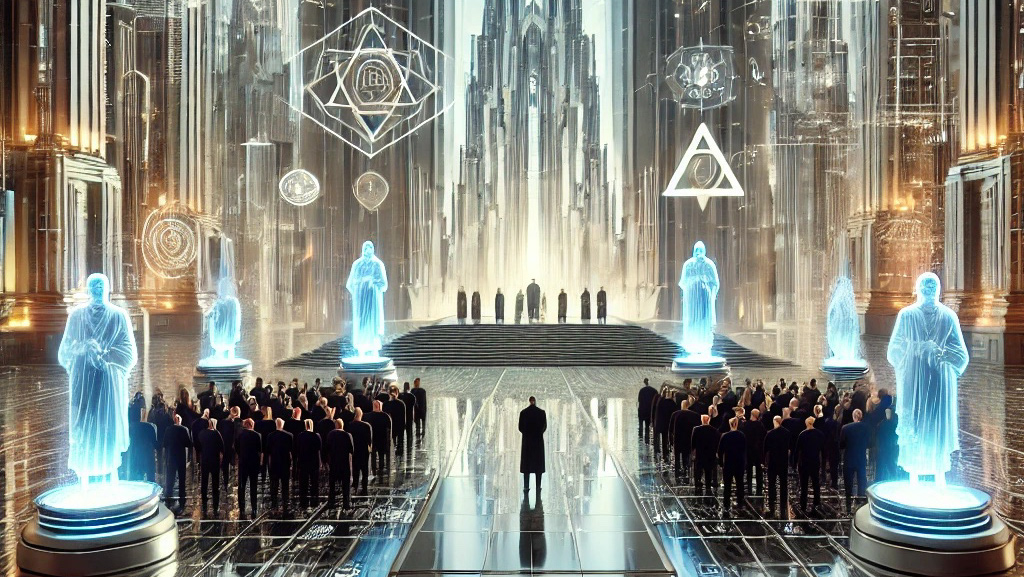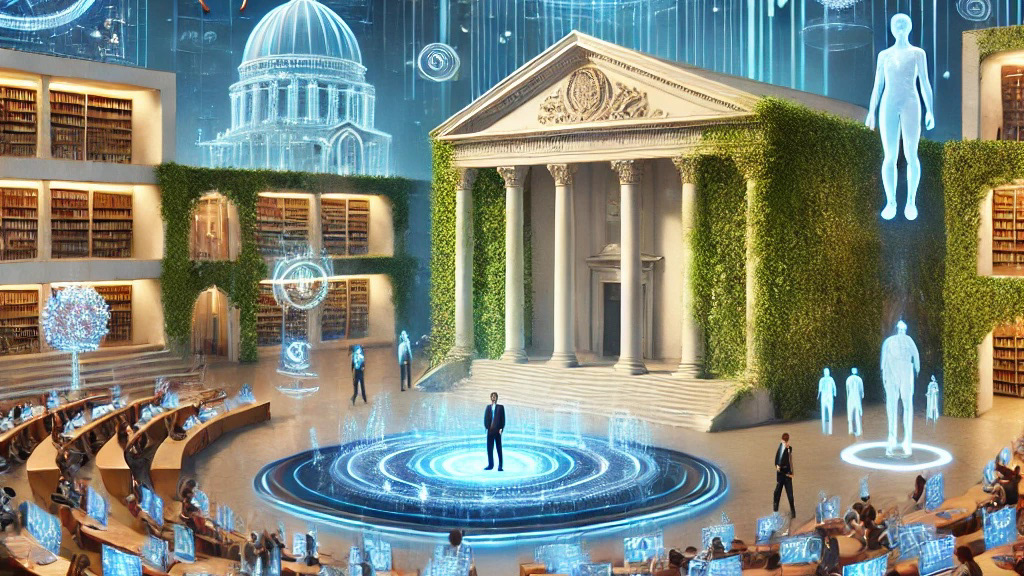We all live in the world where 1+1=2. Well, not really. Sure, one apple plus one apple equals to two, but what if one apple is bigger than the other? Do you still get two apples? Or what if we add one apple plus one orange? How much do we get? Two of what? Or even better, one apple plus one o'clock? Confused yet?
Fortunately for humans, it doesn't matter. No one ever adds apples and oranges because the combination is unthinkable. Instead, we create mental structures that we understand well. We created math, so that we always know what one plus one equals to. Why does one plus one equal to two? It doesn't matter! People have accepted this fact thousands of years ago, so it must be true. The fact that a Greek mathematician gave it a name 2300 years ago supports our logic. As humans, it's often easier for us to just accept it as truth than to challenge it after two millenniums of blind acceptance. We accept 1+1 as reality and don't ever attempt to prove it. The fact that Euclidean math depends on a lot of assumptions doesn't make a difference to us. It's a structure someone created and we happily abide by it.
Human knowledge consists of millions of such structures. We hear other people's biased interpretations of the world and accept them as realities. We then create new ideas based on those false realities and accept them as truths. We then hear even more ideas from other people and interpret them the way that confirms that our pre-existing realities are correct. These ideas are biased, but we close our eyes. Our acceptance of them depends on other realities we believe in that are mere biases as well. As Albert Einstein famously noted, we collect those biases for the first eighteen or so years of our lives and then call them common sense, or common knowledge.
This is scary. Common sense is a collection of biases we acquired from humans that know nothing about the world. They live in the world where one plus one is two. According to statistics collected by the famous Myers Briggs psychological profile, 66% of women and 25% of men use feelings, rather than logic, to make decisions. In the world where one plus one is already two, kids grow up learning from their parents, accepting everything they say as a fact. But 66% of facts originating from mothers are based on feelings rather than facts. Kids grow up collecting those feelings and accepting them as the real world. By the time they become teenagers, they believe they know more than adults. Adults often chuckle at their kids, but adults are more biased than teenagers, simply because they know more. In the world of 1+1, adults have a bigger collection of false realities. But that's okay. By the time teenagers become adults, their database of artificial truths far exceeds that of the previous generation.
As humans progress, they put their biases into systems and structures. They give them funky names, like math and physics. Those structures are set in stone and are indisputable. Humans always know the result of adding one and one. One plus one becomes the world they live in and they refuse to hear anything to the contrary.
Every so often a crazy scientist will question 1+1. But humans have a structure that deals with crazy scientists. Those who questioned whether earth is really supported by a giant turtle were burnt to death. Those that said the earth was round were publicly lynched. In the world of 1+1, crazy scientists are not appreciated.
People enjoy the world of 1+1. In the world of 1+1, we can explain the unknown by giving it a name. We can structure our biases into meaningful groups and base our decisions on them. If our structures don't work as we planned, we justify them with other structures. We also like to completely ignore these structures by using our hormones in decision making.
In the world of 1+1, people prove that Toyotas and Hondas are the only high quality cars and then go out and buy low quality Fords and Nissans. They buy phones that browse the internet, play music, take and store pictures, give driving directions, work as flashlights, and maybe, just maybe, implement Alexander Graham Bell's invention that allows people to communicate over long distances.
In the world of 1+1, people pay a 30% premium for commodity products if they are white and feature an Apple logo. They justify this act as supporting innovation or fitting in the pop culture. They pay 1000% premiums for clothes made in Milan and defend their decisions by stating that Italian clothes look better. They pay $500 for a chance to spend 90 minutes watching a bunch of people fight over a ball. They can't justify this need, so they simply give it a name - FIFA World Cup.
In the world of 1+1, people like power. They create mental models they call organization charts, place participants inside of those models and give them titles. The bigger the org chart, the better. The more your titles differentiates you from those below you, the better. Participants want to grow within this mental model so they can showcase their new title to those below them. Some of those that can't grow within these models, start their own models. They call themselves CEOs, the highest mental state of the person. It doesn't matter that they have no employees. It's better to be a CEO of a one person shop than a senior deputy assistant manager in a company of 1000 other people. Power is everything. Title is power.
But not everyone is willing to start the Me, Myself, and I Corporation in order to get power. It's hard to quit your day job. In fact, your day job pays you a salary, while your own business has no guarantees. This sense of job security is a mental structure people like to place in their heads in order to justify being scared of the unknown. It's a false sense of security, but we rely on it anyway. Statistically your own business has the same chance of failure as that of your own employer. Just look at the list of Fortune 500 companies in 1950 and compare the list with that of today. General Electric is practically the only survivor. But statistics don't matter. This false sense of job security is what makes us loyal to someone else's org charts.
Then there are people that want to gain legitimate power for reasons other than fancy titles. Fortunately for them, the world of 1+1 has structures designed to assist them with their quest. One of them is called religion. It's easy! Just tell people a fairy tale that teaches them a lesson that reinforces your power and you've got them. The more unbelievable the fairy tale, the better. Remember! People don't question facts. A fairy tale is a fact. The easiest fact to sell them your power is to mention that Kool-Aid with arsenic is the quickest path to heaven. Just don't tell them that the world is round. It sounds too good to be true. They won't listen to you.
In the world of 1+1, we believe we are smarter than everyone else around us. We disagree with other people and label them as stupid. We think our bosses are stupid. A recent CareerBuilder study showed that 75% of the people quit their bosses, not their companies. Essentially this means that 75% of the people believe that they are smarter than their bosses. If that's the case, it means the higher you go up the corporate ladder, the dumber you get. The smartest people remain as peons, the dumbest ones become CEOs.
The world of 1+1 is fun! We claim we drink alcohol because it tastes good, but we prefer to drink it at the bar, where its cost is five times higher than it is in the comfort of our own home. We can't explain this phenomena, so we connect it to other things we can't explain, such as the desire to make friends, and finding mating partners. But we don't like to label mating partners as such, even though the nature designed us this way, so we created another structure. We called it marriage. Marriage is a lifecycle. It consists of a number of events that go in a circle, constantly repeating themselves. First we say we will never get married. Then we get married. Then we announce we've made a mistake and get a divorce. We then announce we'll never get married again. Then the marriage lifecycle repeats. It keeps on repeating until we realize that all marriages have flaws. We suddenly get enlightened. Of course the lucky ones get enlightened immediately after the divorce stage. The unlucky bunch keeps their spouses as a reminder of their enlightenment. We don't know why we even need to get married. But it doesn't matter. Marriage is an accepted structure and is the way of life in the world of 1+1.
Every once in a while we have an urge to do something that goes against all the false truths we remember. We buy expensive sports cars or motorcycles, change our physical appearance, and switch jobs. Luckily for us, we don't have to justify such actions to anyone, for this practice has a name in the world of 1+1. It's called the midlife crisis.
In the world of 1+1, people like gossip. They would rather watch a freak show hosted by Oprah Winfrey, hear Congress discuss the president's sex adventures, or discuss OJ Simpson's life, than do something that enhances their health, careers, or well being. People created the whole industry around gossip. They even gave it a name - journalism. Journalists aren't judged by their writing style, but rather by their ability to create gossip out of nothing. This gossip must be designed to provoke conversations. It's not enough to report that the president of the US is visiting Russia. It's much more fun to add something like "... but it's unclear whether or not the president is visiting Russia to meet his mistress." Saying so isn't lying, but it will attract a lot of eyeballs, which will ultimately bring more money to the hungry journalists. Gossip is great! You can profit from it.
In the world of 1+1, people are guided by wishful thinking. They launch companies with no revenues, profits, or any clue about how they will make money. To pay themselves a salary, they raise millions of dollars from venture capitalists, justifying their ignorance with a fashionable word - dot com. The gossip agents spread the word of this new fashion. Before too long, everyone and their dog are invested in the get-rich-quick.com company. Shortly thereafter, these firms go out of business. The word dot com changes its meaning from "quick cash" to "miserable failure". But the story doesn't end here. People spend the next five years criticizing the dot coms. Investors claim they will never invest in companies with no revenues. But they forget that they are driven by wishful thinking, not logic. They invest billions in MySpace, YouTube, and other gossip producing properties that have no viable plans to deliver any revenue. They soon recognize their mistakes, but they refuse to call them by their real names. No, dot com 2.0 doesn't sound sexy enough. Instead, they create fancy terms, like social networks or web 2.0. Granted, some social networking sites make money. This is great! This is yet another proof to wishful thinkers that dot coms 2.0 will make money some day as well.
In the world of 1+1, people are selfish. People care more about their own toothache than they do about millions of people dying of starvation in Africa. They justify their sexual desires with a lavish word "love". They create excuses to act like animals. They call them bachelor parties, spring breaks, and dance clubs.
The world of 1+1 has a name and a structure for everything. These names and structures don't necessarily show the true reflection of the world but they do create mental models that make humans more comfortable. We create models inside of other models, call them knowledge and make decisions based on them. The more mental models you remember, the more valuable you are to an employer. If you possess a somewhat exclusive set of mental models labeled as "MBA", you have magic keys to potential success. And if your mental models came from a prestigious university, you become highly marketable and expensive.
But models are just that - models. Models are based on structures. Structures are results of human mental blocks. Then why do we make decisions based on these models? Because that's all we know. And that's the problem!









